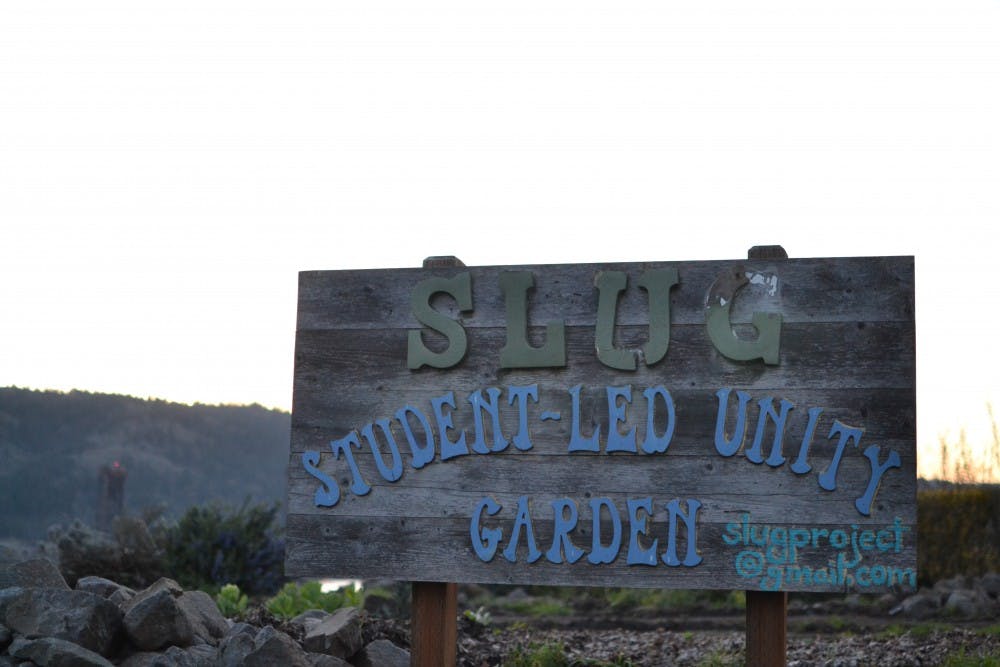by Cheyenne Schoen |
One year ago, the Student Led Unity Garden (SLUG) was overrun with grass and weeds. Strawberries and herbs had gotten lost in the depths of overgrown plants, and worms had taken over the fallow land.
But with the help of students, SLUG advisers and Physical Plant, the garden was revived last summer and had a fruitful harvest, yielding eggplant, tomatoes, lavender, herbs and branch-ripened prunes.
In fact, it’s been doing so well that the garden has outgrown its infrastructure, and SLUG’s leaders have planned a complete redesign of the garden to accommodate its growth.
Members of SLUG have begun to deconstruct the original mandala shape of the garden that was set by the founding members in 2007 and replace it with a system of rows. They will also add an improved irrigation system and compost area, a utility sink for washing produce and possibly a new greenhouse.
Freshman environmental ethics and policy major and SLUG president Molly Burke said the redesign will improve the functionality of the garden and create more of a community space.
“The garden before was really cramped and hard to get wheelbarrows through,” Burke said. “We are extending it and doing some row gardening, so hopefully we can (create) more of a community space to enjoy the garden.”
SLUG co-adviser Nathan Widdicombe said the renovation will consolidate the smaller garden areas into one bigger area so gardeners can all be in one place while working.
“There are a lot of times where one person would be working in the far garden and everyone else would be working in the main garden, so it felt really separate,” Widdicombe said.
The gardeners will begin planting in late March and early April. The SLUG updates its Facebook page with dates of work days for students who are interested in helping plant.
SLUG’s roots
As SLUG’s members look forward to the coming change, Widdicombe said they look back and are grateful for all the hard work prior gardeners put into SLUG to keep it going.
“We are paying tribute to where we’ve come from, because we wouldn’t have a garden if it wasn’t for the people who came before us,” Widdicombe said.
SLUG began in March 2007 when dozens of students, faculty and physical plant workers laid the foundation for the garden in a grass field at the end of North Warren and North Mckenna streets.
A mandala design was constructed by UP adjunct english professor and SLUG founding adviser Heather Burns. Burns is an assistant professor and coordinator of the Leadership for Sustainability Education graduate program at Portland State University, and is also the PSU faculty coordinator of the Learning Gardens Laboratory, a four-acre garden education laboratory.
Burns said she settled on the design for a circular garden with walk-through paths and keyholes for its functionality and beauty.
“The idea is that there is a lot of access to each of the beds through the keyhole, and there is a lot of edge to it,” Burns said of the mandala design. “And also we just wanted to create something that was beautiful, something that wasn’t just straight edges, straight lines, but something that had more of an organic, ecological shape to it.”
Burns said the circular shape does make it more difficult to have an irrigation system.
“It’s hard to set up an irrigation system with the keyholes,” Burns said. “The mandala shape makes it a little trickier.”
But changing a garden’s system that has been established for a while disrupts the soil’s structure, Burns said, and any perennials that grew there will also be disrupted.
Burns said there are different goals that must be considered when designing a garden.
“Straight rows tend to be associated more with intense production because it can be easier to get more workers in the straight rows and tools and wheelbarrows,” Burns said. “At least when we designed the garden, that wasn’t the goal of the garden. Of course we wanted to grow food, and we wanted to share that with the community, but we also wanted to be in harmony with the landscape and to create something beautiful, that wasn’t just a farm, but was a garden.”
Burke said SLUG hopes to take the founders’ ideas and carry them on through the redesign.
“We are hoping to continue their idea, just with a different approach, but with the same idea at heart,” Burke said. Cheyenne is a reporter at The Beacon. She can be reached at schoen17@up.edu.








